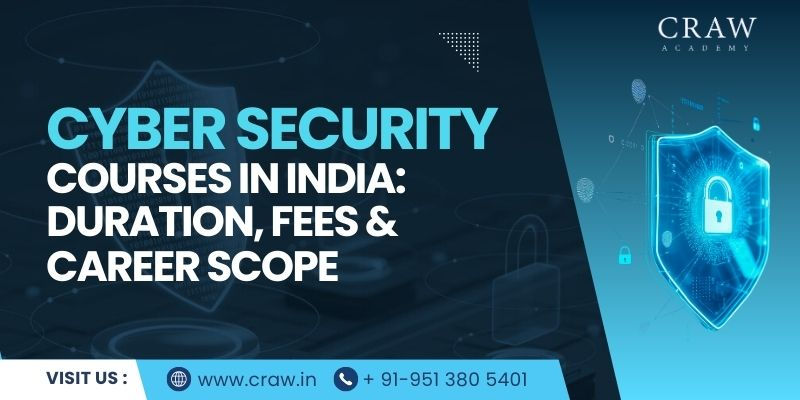Cybersecurity Courses in India: Duration, Fees & Career Scope
- Manisha Chaudhary
- Aug 21, 2025
- 7 min read

With India’s digital ecosystem expanding rapidly, the demand for skilled professionals in cybersecurity is at an all-time high. From safeguarding sensitive data to defending against cyberattacks, the need for experts in this field is growing across IT, banking, e-commerce, and government sectors. Enrolling in the right cybersecurity courses in India can equip you with essential skills, industry-recognized certifications, and lucrative career opportunities. In this guide, we’ll cover the types of courses available, their duration, fees, top institutes, and the Cybersecurity Courses in India: Duration, Fees & Career Scope in 2025 and beyond.
Importance of Cybersecurity Education in 2025

In 2025, cyber threats are becoming more sophisticated, targeting individuals, businesses, and even critical infrastructure. With the rise of AI-driven attacks, ransomware, phishing scams, and cloud vulnerabilities, organizations can no longer rely on outdated security measures. This makes cybersecurity education a vital requirement rather than an optional skill.
Pursuing cybersecurity courses in India equips students and professionals with the technical expertise to detect, prevent, and respond to cyber incidents effectively. Trained cybersecurity experts are in high demand across industries, offering job security, competitive salaries, and global career opportunities. As India continues its digital transformation, investing in cybersecurity education today ensures you stay ahead in one of the fastest-growing career fields in the world.
Cybersecurity Courses in India

With cyber threats becoming more advanced and frequent, the demand for skilled cybersecurity professionals in India has surged. Cybersecurity courses in India are designed to equip learners with the technical expertise and practical skills needed to protect systems, networks, and data from attacks.
These courses range from short-term certifications in Ethical Hacking, Cyber Forensics, and Penetration Testing to full-fledged diploma and degree programs like B.Tech or M.Sc in Cybersecurity. Many top institutes, including Craw Security, offer both online and offline learning options, enabling students and working professionals to learn at their own pace.
By enrolling in a reputed cybersecurity course, you gain hands-on experience in network security, risk assessment, incident response, and cloud security, along with globally recognized certifications that boost employability in India and abroad.
Types of Cybersecurity Courses in India
Cybersecurity courses in India come in multiple formats, catering to students, working professionals, and IT experts looking to upskill. Each type of course offers unique benefits depending on career goals, duration, and learning preferences.
1. Degree Programs
B.Tech/B.Sc in Cybersecurity — Duration: 3–4 yearsM.Tech/M.Sc in Cybersecurity — Duration: 1–2 yearsComprehensive academic programs covering fundamentals, advanced defense techniques, and emerging technologies.
2. Diploma & PG Diploma Courses
Duration: 6–12 monthsFocused on practical skills like network security, cyber forensics, and ethical hacking.Ideal for fresh graduates or professionals seeking quick specialization.
3. Certification Courses
Duration: 3–6 monthsPopular options include CEH (Certified Ethical Hacker), CompTIA Security+, CISSP, and Offensive Security certifications.Best for skill upgrades and industry-recognized credentials.
4. Online vs Offline Learning
Online: Flexible schedules, virtual labs, and cost-effective learning.Offline: In-person classes, hands-on labs, and networking opportunities with peers and instructors.
Duration of Cybersecurity Courses in India

The duration of cybersecurity courses in India varies depending on the type of program, depth of study, and mode of learning. Students can choose from short-term certifications to full-fledged degree programs based on their career goals and time availability.
Short-Term Certification Courses — 3 to 6 months
Focus on specific skills like ethical hacking, penetration testing, cyber forensics, and cloud security. Ideal for quick upskilling and career enhancement.
Diploma & PG Diploma Programs — 6 to 12 months
Provide a comprehensive understanding of cybersecurity concepts with practical lab training. Suitable for fresh graduates and working professionals.
Undergraduate Degrees (B.Tech/B.Sc) — 3 to 4 years
Offer an in-depth curriculum covering networking, cryptography, cyber laws, digital forensics, and advanced defense mechanisms.
Postgraduate Degrees (M.Tech/M.Sc) — 1 to 2 years
Focus on advanced topics, research projects, and leadership skills in cybersecurity.
Fees for Cybersecurity Courses in India

When it comes to industry-relevant and hands-on learning, Craw Security is among the leading training providers for cybersecurity in India. The institute offers a wide range of programs — from beginner-level certifications to advanced penetration testing — designed for students, IT professionals, and corporate teams.
The fees for cybersecurity courses at Craw Security depend on the program type, duration, and learning mode (online or offline):
Basic Cybersecurity Certification: ₹15,000 — ₹30,000Ethical Hacking Course (CEH v12): Around ₹30,000 — ₹45,000Advanced Penetration Testing & Bug Bounty: ₹40,000 — ₹60,000Cyber Forensics & Investigation Course: ₹25,000 — ₹40,000Complete Cybersecurity Diploma (Multiple Modules): ₹80,000 — ₹1,20,000
Craw Security also provides:
Flexible payment options for students and working professionalsOnline and classroom training with live practical labsPlacement assistance with top IT and security firms
Career Scope in Cybersecurity in India

The career scope in cybersecurity in India is rapidly expanding as organizations across sectors face increasing threats from cyberattacks, data breaches, and ransomware. According to industry reports, India is expected to have over 1.5 million unfilled cybersecurity job roles by 2025, creating immense opportunities for skilled professionals.
Top Job Roles in Cybersecurity
Cybersecurity Analyst — Monitors and protects networks from threats.Ethical Hacker / Penetration Tester — Identifies vulnerabilities before attackers can exploit them.Security Consultant — Advises companies on strategies to enhance their security posture.Incident Responder — Handles cyber incidents, mitigates damage, and prevents future attacks.
Industries Hiring Cybersecurity Professionals
Information Technology (IT) & SoftwareBanking, Financial Services & Insurance (BFSI)E-commerce & RetailGovernment & DefenseHealthcare & Telecom
Salary Range in Cybersecurity Careers
Freshers: ₹4–6 LPAMid-level Professionals: ₹8–15 LPAExperienced Experts & Managers: ₹20+ LPAProfessionals with globally recognized certifications like CEH, CISSP, and CompTIA Security+ can command even higher packages.
Future Demand for Cybersecurity in India
With the growth of cloud computing, IoT, AI, and digital payments, cyber risks are also increasing. This ensures a long-term career scope for cybersecurity experts, both in India and abroad. Skilled professionals can also work as freelancers or consultants for global clients, offering remote cybersecurity services.
Skills You Learn in Cybersecurity Courses

Enrolling in cybersecurity courses in India equips you with both technical expertise and practical skills to combat modern cyber threats. Whether you pursue a diploma, certification, or degree program, these courses focus on building core competencies that are in high demand across industries.
1. Network Security
Learn how to secure computer networks from unauthorized access, malware, and data breaches using firewalls, intrusion detection systems (IDS), and encryption methods.
2. Penetration Testing
Gain the ability to simulate cyberattacks to identify vulnerabilities in systems, applications, and networks before malicious hackers can exploit them.
3. Risk Assessment
Understand how to evaluate an organization’s security posture, identify potential threats, and recommend strategies to mitigate risks effectively.
4. Cyber Forensics
Develop skills to investigate cybercrimes, collect and preserve digital evidence, and assist in legal proceedings involving online threats.
5. Cloud and IoT Security
Learn how to secure cloud platforms, connected devices, and IoT ecosystems against advanced persistent threats (APTs) and emerging attack vectors.
By mastering these skills, you become well-prepared for diverse roles such as cybersecurity analyst, ethical hacker, security consultant, and incident responder — all offering excellent career growth and global opportunities.
How to Choose the Right Cybersecurity Course
With so many cybersecurity courses in India available, selecting the right one can significantly impact your career growth. Here are key factors to consider before enrolling:
1. Accreditation & Certifications
Choose an institute or program that offers globally recognized certifications such as CEH, CompTIA Security+, or CISSP. Accreditation ensures that the course content meets industry standards and increases your credibility with employers.
2. Placement Assistance
Opt for a training provider that offers job placement support or direct hiring opportunities. Institutes like Craw Security have strong industry connections to help graduates secure positions quickly.
3. Hands-on Training & Lab Access
Cybersecurity is a practical field, so ensure the course provides real-world lab environments where you can practice penetration testing, incident response, and network defense skills.
4. Faculty Expertise
Experienced instructors with industry backgrounds bring real-world insights into the classroom, making the learning experience more valuable and relevant.
By evaluating these factors, you can select a program that not only imparts knowledge but also builds the practical skills and professional network you need for a successful cybersecurity career in India.
Frequently Asked Questions (FAQ)
Q1: What is the best cybersecurity course in India?
The best course depends on your career goals, but popular choices include Ethical Hacking, Cyber Forensics, and Advanced Penetration Testing offered by reputed institutes like Craw Security.
Q2: What is the average duration of cybersecurity courses in India?
Duration ranges from 3–6 months for certifications, 6–12 months for diplomas, and 3–4 years for degree programs.
Q3: How much does a cybersecurity course cost in India?Fees vary from ₹15,000 for short-term certifications to ₹1,20,000+ for advanced diploma programs, depending on the institute and course content.
Q4: Is cybersecurity a good career in India?
Yes, cybersecurity is one of the fastest-growing career fields, with high demand in IT, banking, government, and global markets.
Q5: Can I learn cybersecurity online in India?
Yes, many institutes, including Craw Security, offer online cybersecurity courses with live classes, virtual labs, and flexible schedules.
Q6: What jobs can I get after completing a cybersecurity course?
You can work as a Cybersecurity Analyst, Ethical Hacker, Security Consultant, or Incident Responder.
Q7: Do I need coding skills to learn cybersecurity?
Basic programming knowledge (Python, Java, or C) can be helpful but is not mandatory for all cybersecurity roles.
Q8: What certifications are most valued in cybersecurity?
CEH, CISSP, CompTIA Security+, and OSCP are among the most recognized certifications in the industry.
Q9: Is there a demand for cybersecurity professionals in India?
Yes, India is expected to have over 1.5 million unfilled cybersecurity jobs by 2025.
Q10: Can a fresher get a job in cybersecurity?
Yes, freshers with the right skills, certifications, and hands-on training can secure entry-level cybersecurity positions.
Conclusion
The demand for cybersecurity professionals in India is at an all-time high, driven by the rapid adoption of digital technologies and rising cyber threats. Pursuing the right cybersecurity course — whether it’s a short-term certification, diploma, or degree — can open the door to high-paying, future-proof career opportunities.
Institutes like Craw Security provide practical, industry-aligned training with globally recognized certifications, helping students gain job-ready skills in network security, penetration testing, cyber forensics, and more.
If you’re looking to build a stable and rewarding career, now is the perfect time to upskill with a cybersecurity course in India and secure your place in this fast-growing industry. WhatsApp now for more information




Comments